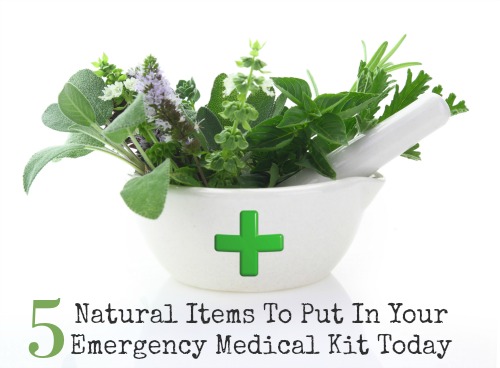
(Sign up for our FREE newsletter to get the latest prepping advice, gardening secrets, homesteading tips and more delivered straight to your inbox!)
5 Items To Put In Your Emergency Medical Kit Today
1. Books
One cannot become proficient at something without study and application. Going as far as to take medical courses in community colleges, local county extension offices, local fire departments, and with veterans groups, along with other civic clubs and organizations can give you a great edge on acquiring knowledge on medical emergencies and how to treat them. It should go without saying, but stock up on medical manuals like:
- The Survival Medical Handbook
- Herbal Antibiotics: Natural Alternatives for Treating Drug Resistant Bacteria
- Prepper’s Natural Medicine
- Wilderness Medicine
- Medicine for the Outdoors
- A Barefoot Doctor’s Manual
- Field Guide of Wilderness & Rescue Medicine
- Wilderness Medicine, Beyond First Aid
2. Kitchen Staples
Since most of us have limited shelf space, it is only logical to find shelf stable foods and products that will perform multiple jobs for us. And some of your kitchen staples can do just that – including medical care. For instance, did you know you can make an antiseptic (first discovered during World War I) made of a diluted solution of baking soda and bleach? It’s called Dakin’s Solution and has been proven to kill most bacteria and viruses.
3. Honey
As well, honey has become a poster child for an alternative to antibiotics. In fact, numerous studies have shown that certain kinds of honey can fight multiple species of bacteria, fungi, and superbugs, making it a viable alternative to antibiotics.
As Ready Nutrition writer, Jeremiah Johnson recently wrote, “Honey is also good for wounds/abrasions/cuts of the mouth, as it is a demulcent that soothes abraded tissues, and it also is a medium that microbes do not live in. Who doesn’t remember the time-honored honey and lemon mixture for a sore throat? The thing of it is: it works, and if it works it should be employed. Read more on how to use honey to treat wounds.
4. Medicinal Herbs
Having access to health-inducing herbs is another essential for wound care. Herbs such as oregano, garlic, lavender and thyme can help protect a wound from infection and promote healing. Along those lines, writer, Jeremiah Johnson recommends every prepper have the Three G’s: Ginger, Garlic and Ginseng in their natural medicine cabinet. Further, knowing which herbs can be used for natural pain killers is also paramount in your medical preparedness knowledge. Some pain reducing herbs to add to your herbal first-aid kit are:
- Aloe (Aloe vera)
- Calendula (Calendula officinalis)
- Comfrey (Symphytum officinale)
- Gotu Kola (Centella asiatica)
- Tea (Camellia sinensis)
- Lavender (Lavandula angustifolia)
Common pantry items can also be used to help bleeding wounds clot. Many have found that cayenne pepper is an effective alternative and natural version of QuikClot. Cayenne pepper contains an active ingredient, called capsaicin, which has analgesic (pain relieving) properties and various other medicinal uses.
5. Essential Oils
In an extended disaster, bacterial infections and viruses are likely to be one of the reasons that people will die. Historically, essential oils have been used as a natural therapy to relieve symptoms when modern-day medicine was not available. The most amazing aspect of essential oils lies in their ability to effectively kill bad bacteria while leaving good bacteria alone! Rather than targeting one symptom, as Western medicine does, it targets multiple symptoms. There are two types of essential oils you should stock up on for SHTF planning:
Antibacterial – Due to the increase of antibacterial resistant illnesses, many are turning to essential oils such as basil, cassia, cinnamon, clove, cypress, eucalyptus, geranium, lavender, lemon, marjoram, melaleuca, myrrh, orange, oregano, peppermint, rosemary, tea tree and thyme.
Antiviral – Oils that have been studied to help control viral infections include: basil, cassia, cinnamon, eucalyptus, frankincense, lemon, lemongrass, marjoram, Melaleuca, myrrh, oregano, and thyme.
I started out with a simple beginner’s essential oil kit and have found it of great use! Some more popular ways of using essential oils are aromatherapy, herbal soaks, compresses, tinctures and salves.
Things can go awry very quickly when a medical emergency occurs during a disaster. Having resources to turn to, skills to treat wounds, along with items you have around you can be lifesaving.
